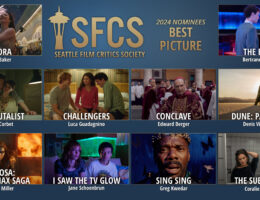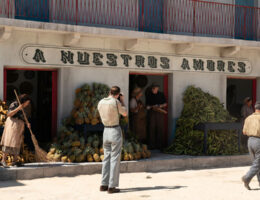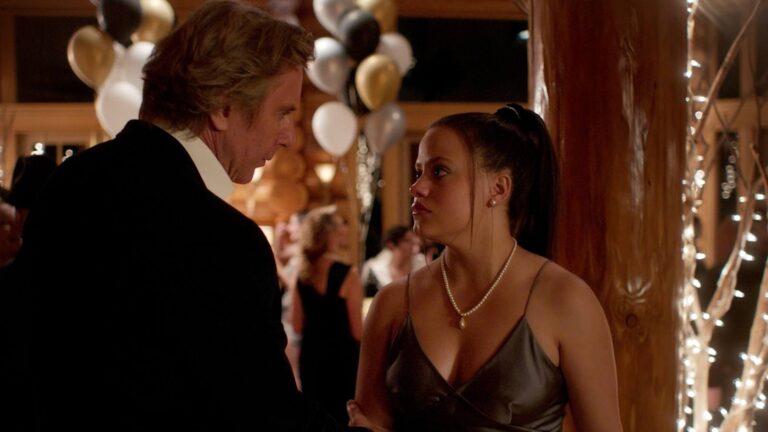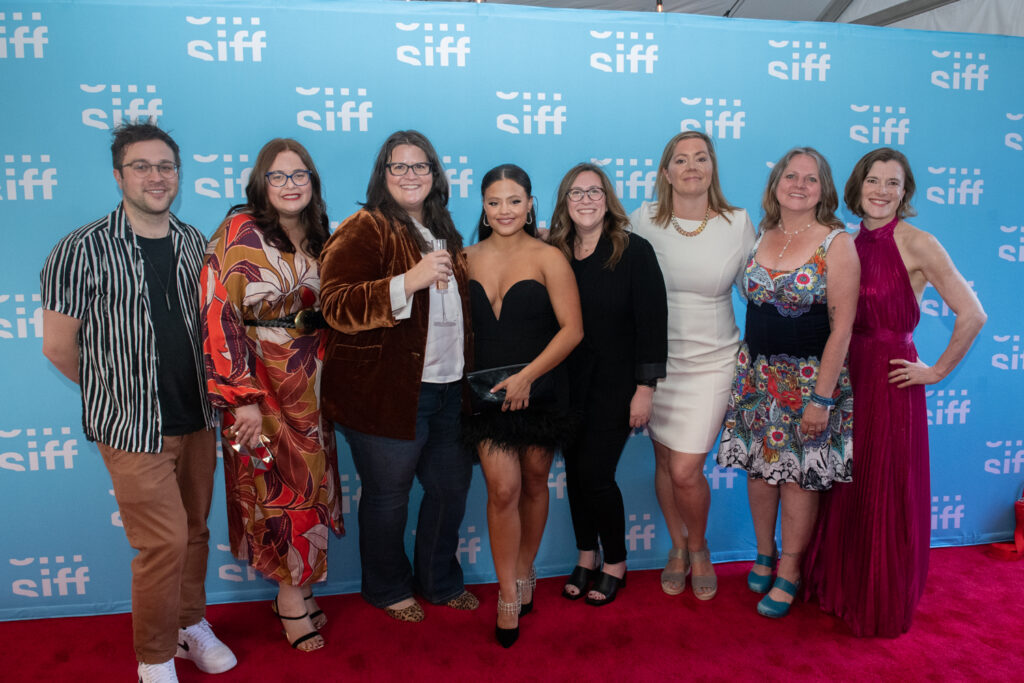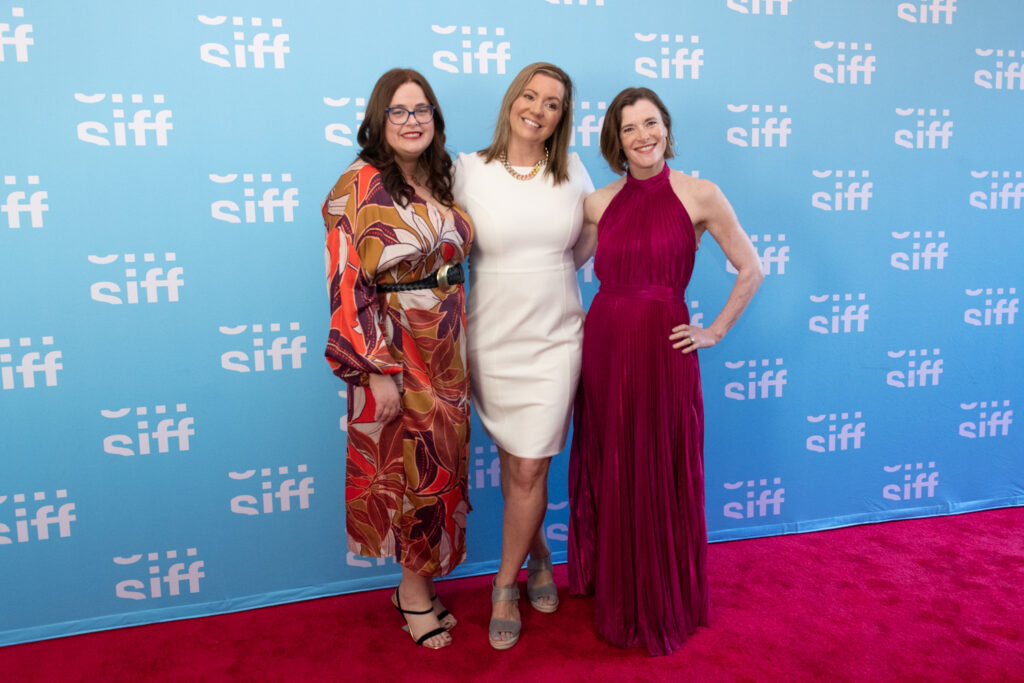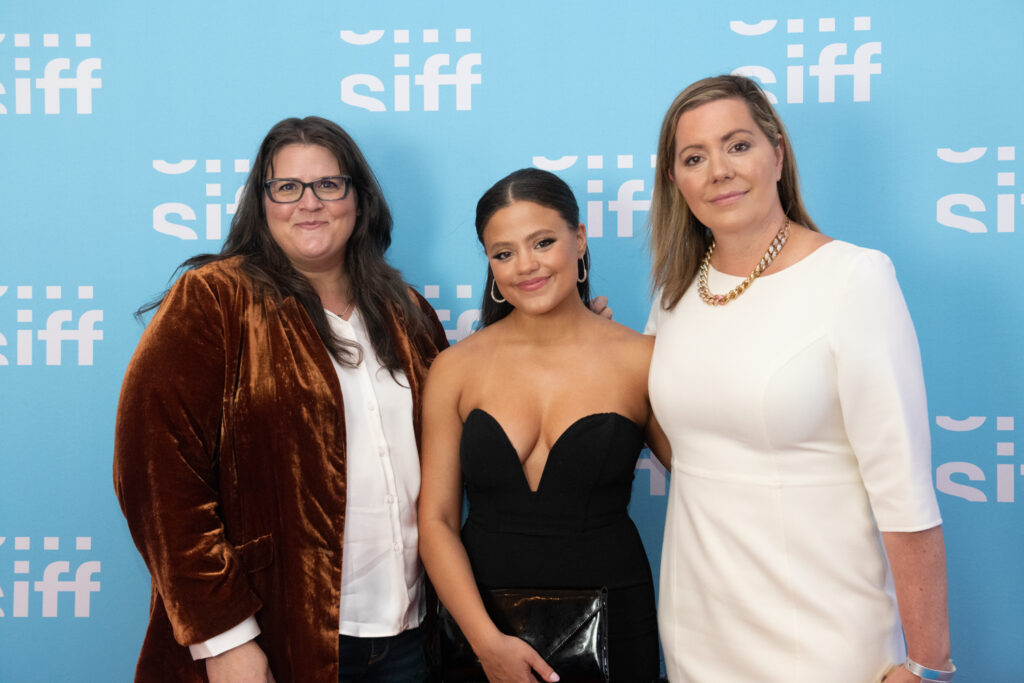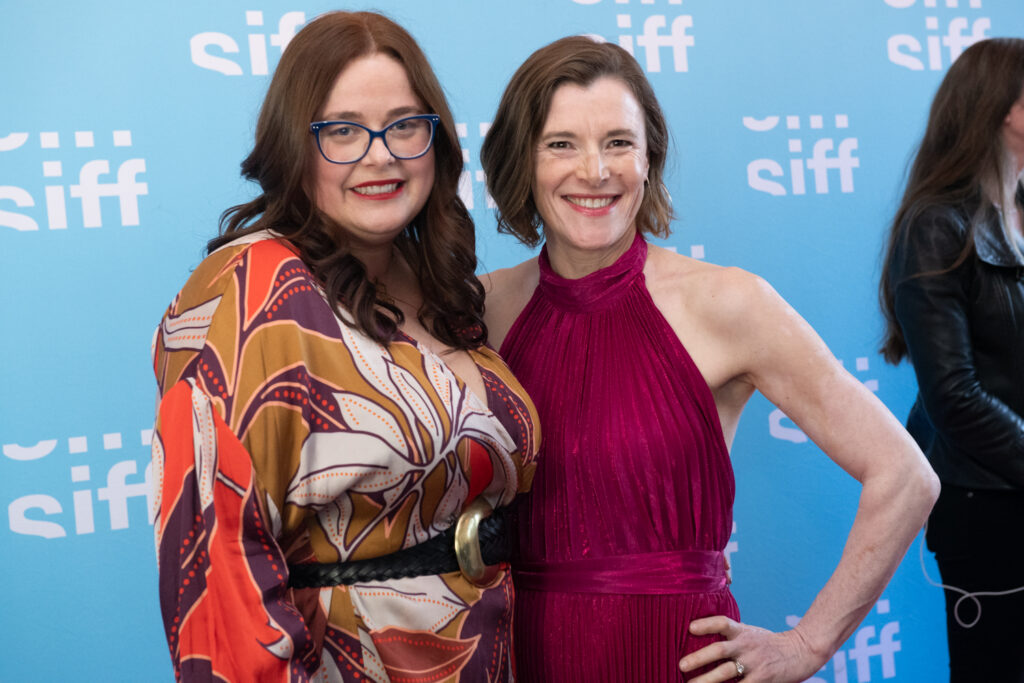Yet again local (and beloved) director Megan Griffiths has a SIFF favorite on her hands. Year of the Fox is set in Aspen, CO where Ivy (Sarah Jeffrey) is on the cusp of womanhood but hesitant to grow up too fast. Unfortunately her parents’ imminent divorce — a father far too distracted by the opulent world of Aspen “royalty” and her mother dealing with the fallout of losing both her marriage and the life she’d always known — leaves little room for parental support. Confronted with the harsh realities of the very real caste system that still exists in our country, toxic masculinity, and the realization that her dad may not be the man he’d convinced her he was, she’s forced to figure it out on her own. I don’t know about you, but at her age I wouldn’t have been able to feed myself much less upend my whole reality and come out the other side in one piece.
I had the fantastic opportunity to catch up with Megan to talk shop, Year of the Fox and her drive to work on women-focused characters and films.
It took writer Eliza Flug quite a while to get the script where she wanted it. Were you a part of that early on? What brought you to the project?
Megan: Eliza and I met in 2011 through mutual friends, so we’ve known each other for a long time. We had the chance to work together when she became the executive producer on Sadie in 2018. I’d known she was working on a project that was inspired by her coming of age in Aspen for a while. In 2020 she shared the script with me and I was pulled in by it. I found this world to be fascinating, not being one I grew up in. Her front row seat for the parties and notorious predators that crossed their paths. Even though it’s set in the 90s it’s not like these things are past tense. Still a lot of predatory behavior going on, so it’s completely relevant and relatable; I just really wanted to jump in and collaborate. The two of us spent the next year getting it pulled together and ready for production. Lacey Levitt and Jennifer Roth were also on board as producers and that team is what got it ready and into production and we’ve been collaborating on it all along.
It sounds like you and Eliza had a great working relationship during the project. Did you feel like you had a partnership or were you there to support her in the story since it was such a personal one to her?
Megan: I definitely felt like it was a partnership. There was no one with more authority than Eliza so I always leaned on her to confirm that she found it believable as someone who grew up in that world and it was reflecting the story that she wants to tell. I never want to come in and take over and say “My story now, bye!” She was on set and we were always checking in and I feel like I brought in, what I always bring in as a director, is an attention to all the details that go into whoever you see on screen. I focus on character and approaching the them with empathy, helping to pull out the nuanced performances that all of our actors brought to this movie. It was a good collaboration in that way because we were able to bring things to the table that the other didn’t have.
Even though, like you, it’s not a world that I have ever experienced and in that way feels completely foreign, there’s still a sense of connection with the characters. Did you have intention behind that?
Megan: I think it was helpful that the script was written through the eyes of Ivy because she was brought into that world; she wasn’t born into it she was adopted into it and always had this outsider on the inside perspective. That was another thing I liked about the script because it felt like she could take the audience’s hand, lead them into this world. For the audience, she’s there experiencing it, but she’s also scrutinizing it and trying to understand it the way all of us try to understand our circumstances when we’re that age. Try to see where we fit as a sexualized person in the world. I feel like telling it through her eyes was really helpful.
Was the concept of grooming, seeing women as possessions and playthings, an intentional part of the story or did it just happen to be a part of the story that Eliza experienced and became more of a focus in the film?
Megan: That was always intended to be a part of the story. The fact that it was accepted and even celebrated in our society especially in the late 90s in a world that weaponized women’s sexuality left and right as far as personalities in the media. That’s the world that these girls grew up in and so certainly there was a lot of awareness around that. Not wanting to leave out that there’s complicity from the women as well, we all sort of bear the burden of calling these things out and accepting that they’re real.
I think that it’s a complicated conversation because there’s agency on the part of the young girls, but they’re also under the age of consent. It’s a conversation that was baked right into this story and the fact that Ivy encounters these predators under the not-so-watchful eye of her father is just a part of it. It’s a story of broken trust in a family. It’s all sort of intermixed. This is the world she grew up in and this is the behavior she’s only ever seen celebrated and accepted instead of called out for what it was.
The gaslighting by men of authority in their lives who are saying “oh no it’s fine, this is normal” when they’re the ones that should be watching out for them is disgusting. It almost feels like Ivy is the moral center of this story by questioning, being repulsed by what she sees. Do you feel like she was the moral center, was that your intention?
Megan: I feel like that’s fair to say. She’s definitely struggling with accepting the realities that she’s seeing in front of her. She comes into the story in a fairly innocent place. It’s a pretty big fall for her to understand with more clarity what world she has been living in. It takes a lot of inner strength to find out that you can follow your own instincts instead of these well-trodden paths that have been set out for you as your only options. I think she’s got a good head on her shoulders.
With her mom you weren’t sure if she knew exactly what was going on or if she just turned a blind eye and pretended not to know. In your mind, what role did her mom have in this story?
Megan: I think her mom is as baked into the societal norms as Ivy is in the beginning. She’s pulling away because of the divorce and it takes that distance for her to unravel it from her own psyche. Before she can turn her attention to Ivy and her well-being. I think there’s a journey that Pauline (played by the brilliant Jane Adams) takes as well.
Pauline still wants to be a part of that world even after she moves to Seattle to get some space between her and Ivy’s dad, and it’s almost heartbreaking. Speaking of Seattle, were you eager to film here again on a bigger project?
Megan: Yes, I mean I always love shooting here. I would shoot here all the time because it’s a lovely community to shoot in and always super supportive. It’s always been that way for me anyway, I love that about this city. We did shoot a great deal of the movie in Seattle even though a majority of the film is set in Aspen, Colorado. Not to pull the curtain back but there’s a lot of similarities in geography between the two cities. We did do some B-roll and drone footage of Aspen to make sure we were capturing that beauty but we shot the majority of the film in the North Bend region.
Go a little further in your experience working with the Seattle film community. I know your experience isn’t necessarily universal but what makes it so wonderful?
Megan: I’ve always found it super supportive and giving, from fellow crew members to vendors to locations. It’s been a really great experience for me. I don’t know if that’s out of the ordinary, but it feels like I know a lot of people that feel that way. We are not an industry hub. Maybe we are moving that way, we are certainly making strides in that direction. Fingers crossed, we’re certainly hoping to have more long-term sustainable narrative work for folks in the future, but as of now we do have a lot of corporate, commercial work that sustains our crews. When I’ve come around with a project, people tend to be very responsive and happy and ready to work on something that has themes they’re interested in. They rally around it and it feels like you have all these very passionate, excited people on your set and that feeds into the safe bubble and warm environment when you have crew that are just happy to be there. That’s been my experience mostly so I hope it’s like that for others. I’ve always been a cheerleader for the Seattle Film community because I’ve had nothing but lovely times. I’ve gone out and filmed in a lot of places now through my work and there’s great film communities throughout the country, it’s not like we’re the only one, but we are definitely one of them.
Historically from posts and interviews you’ve done, it seems like you make it a priority to foster positivity and support for everyone on your crew and cast, not just the folks you directly interact with. Was that something you’ve always made a priority or is that something you’ve learned over time?
Megan: I’ve worked on a lot of sets. I was an AD for a long time and that was probably the most exposure I had to other directors. I was also a DP when I first started, but I’ve been on a lot of sets doing a lot of different jobs. Seeing how a director comes in and manages things, how they communicate is important to the overall well-being of the whole set. It all impacts performance, because an actor is walking around like an open wound allowing themselves to be vulnerable all the time to get the best performance, and as a director it benefits you to allow them to be that vulnerable. So coming into a set that has tension or fights or yelling, I just never felt like that was conducive to getting good performances. I think the natural instinct in a negative environment is to shut down. I definitely saw both sides of those things happening when I’ve worked on other people’s sets but certainly working on Lynn Shelton’s movies I was exposed to the creation of a safe bubble and the nurturing of that; how you have to curate the set to make sure everyone there is understanding what you want to do. At the end of the day of course everyone is watching the actors on screen, but that safe bubble is created when everyone involved feels taken care of.
There’s this mythologizing around difficult directors, difficult male directors mostly, who are able to wield these works of genius because they create a horrible environment for everyone. I’ve been told by some people in the industry, sometimes the worst time they’ve had on sets yields the best movies, but I just feel like that is a myth. Maybe it happens once in a while because the material is good enough to overcome, but I believe people who feel safe do better work. It’s how I’ve approached all of my sets because once you’ve seen it handled differently as a crew member, it gives you a lot of perspective. For me it has really informed how I work; those good and bad experiences.
Speaking of your directorial resume, when you have say in what it is you’re creating, it weighs heavily toward female experiences, and intense ones to boot. Being a male-dominated profession, do you feel like it’s because you connect with those stories or is it that you recognized those stories aren’t being told and you feel compelled to tell them?
Megan: It’s both of those things. I have a natural affinity to sympathize with these characters coming from life as a woman myself. I have worked on projects where it’s not a female protagonist and bring the same sort of empathy to those characters too, but I yeah I think there are fewer people telling these stories and doing it with a seriousness that some of the topics deserve.
As for the dramatic side, if you make the whole project too intense, the audience is under water and they never get to come up for breath. I always like there to be moments of levity throughout, or some kind of action or just things that sort of break up the tension; that’s definitely important. It can be a bit of a slog if you’re watching a film that’s relentlessly dramatic, but these narratives deserve to be looked at and to be viewed with a respect for their value in the hierrarchy of stories.
Do more intense stories keep coming to you or do you feel you’re drawn to them? Would you like to move more toward a more light-hearted genre?
Megan: There are other elements to [these intense] projects, but when you’re exploring emotional territory and interpersonal dynamics, there’s just inherent drama in those. When I made Lucky Them it was so fun to have such a light-hearted experience and dance around on set. I’m certainly interested in lighter topics. But making any movie is a political act. I’m always really aware of anything I put out into the world and how I’m discussing them. That draws me to topics that are more substantial. Not to say that you can’t access substantial topics in comedy or sci-fi but I just want to make sure I’m putting stuff out in the world that can contribute to the conversation. It’s an opportunity. You never know what size platform a movie will have at the end of the day, but I feel like it’s an opportunity to say something meaningful. I always want to take that seriously.
Thanks so much for taking the time to talk with me and have a great time at your premier!
Photos from SIFF Opening Night Gala of Director Megan Griffiths with her cast and crew
Year of the Fox made its world premiere at the Seattle International Film Festival late last week. We’ll keep you posted on release dates and where to see it as soon as we know!

The Seattle International Film Festival runs from May 11-21 in person and May 22-28 online. Keep up with our reactions on Twitter (@thesunbreak) and follow all of our ongoing coverage via our SIFF 2023 posts

